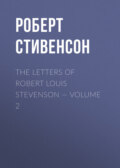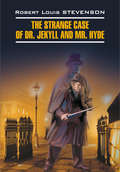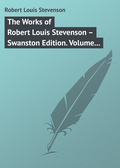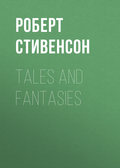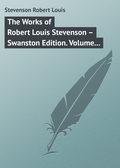
Роберт Льюис Стивенсон
The Works of Robert Louis Stevenson – Swanston Edition. Volume 23
To Edmund Gosse
608 Bush Street, San Francisco, California, Jan. 23, 1880.
MY DEAR AND KIND WEG, – It was a lesson in philosophy that would have moved a bear, to receive your letter in my present temper. For I am now well and well at my ease, both by comparison. First, my health has turned a corner; it was not consumption this time, though consumption it has to be some time, as all my kind friends sing to me, day in, day out. Consumption! how I hate that word; yet it can sound innocent, as, e. g., consumption of military stores. What was wrong with me, apart from colds and little pleuritic flea-bites, was a lingering malaria; and that is now greatly overcome, I eat once more, which is a great amusement and, they say, good for the health. Second, many of the thunderclouds that were overhanging me when last I wrote, have silently stolen away like Longfellow’s Arabs: and I am now engaged to be married to the woman whom I have loved for three years and a half. I do not yet know when the marriage can come off; for there are many reasons for delay. But as few people before marriage have known each other so long or made more trials of each other’s tenderness and constancy, I permit myself to hope some quiet at the end of all. At least I will boast myself so far; I do not think many wives are better loved than mine will be. Third and last, in the order of what has changed my feelings, my people have cast me off, and so that thundercloud, as you may almost say, has overblown. You know more than most people whether or not I loved my father.27 These things are sad; nor can any man forgive himself for bringing them about; yet they are easier to meet in fact than by anticipation. I almost trembled whether I was doing right, until I was fairly summoned; then, when I found that I was not shaken one jot, that I could grieve, that I could sharply blame myself, for the past, and yet never hesitate one second as to my conduct in the future, I believed my cause was just and I leave it with the Lord. I certainly look for no reward, nor any abiding city either here or hereafter, but I please myself with hoping that my father will not always think so badly of my conduct nor so very slightingly of my affection as he does at present.
You may now understand that the quiet economical citizen of San Francisco who now addresses you, a bonhomme given to cheap living, early to bed though scarce early to rise in proportion (que diable! let us have style, anyway), busied with his little bits of books and essays and with a fair hope for the future, is no longer the same desponding, invalid son of a doubt and an apprehension who last wrote to you from Monterey. I am none the less warmly obliged to you and Mrs. Gosse for your good words. I suppose that I am the devil (hearing it so often), but I am not ungrateful. Only please, Weg, do not talk of genius about me; I do not think I want for a certain talent, but I am heartily persuaded I have none of the other commodity; so let that stick to the wall: you only shame me by such friendly exaggerations.
When shall I be married? When shall I be able to return to England? When shall I join the good and blessed in a forced march upon the New Jerusalem? That is what I know not in any degree; some of them, let us hope, will come early, some after a judicious interval. I have three little strangers knocking at the door of Leslie Stephen: The Pavilion on the Links, a blood and thunder story, accepted; Yoshida Torajiro, a paper on a Japanese hero who will warm your blood, postulant; and Henry David Thoreau: his character and opinions– postulant also. I give you these hints knowing you to love the best literature, that you may keep an eye at the mast-head for these little tit-bits. Write again, and soon, and at greater length to your friend. – Your friend,
(signed) R. L. S.
To Charles Baxter
608 Bush Street, San Francisco, Jan. 26, ’80.
MY DEAR CHARLES, – I have to drop from a 50 cent to a 25 cent dinner; to-day begins my fall. That brings down my outlay in food and drink to 45 cents or 1s. 10½d. per day. How are the mighty fallen! Luckily, this is such a cheap place for food; I used to pay as much as that for my first breakfast in the Savile in the grand old palmy days of yore. I regret nothing, and do not even dislike these straits, though the flesh will rebel on occasion. It is to-day bitter cold, after weeks of lovely warm weather, and I am all in a chitter. I am about to issue for my little shilling and halfpenny meal, taken in the middle of the day, the poor man’s hour; and I shall eat and drink to your prosperity. – Ever yours,
R. L. S.
To Professor Meiklejohn
One day at the Savile Club, Stevenson, hearing a certain laugh, cried out that he must know the laugher, who turned out to be a fellow-countryman, the late John Meiklejohn, the well-known educational authority and professor at St. Andrews University. Stevenson introduced himself, and the two became firm friends. Allusion was made a few pages back to a letter from Professor Meiklejohn about the Burns essay.
608 Bush Street, San Francisco, California, Feb. 1st, 1880.
MY DEAR MEIKLEJOHN, – You must think me a thankless fellow by this time; but if you knew how harassed and how sick I had been, and how I have twice begun to write to you already, you might condescend to forgive the puir gangrel body. To tell you what I have been doing, thinking, and coming through these six or seven months would exhilarate nobody: least of all me. Infandum jubes, so I hope you won’t. I have done a great deal of work, but perhaps my health of mind and body should not let me expect much from what I have done. At least I have turned the corner; my feet are on the rock again, I believe, and I shall continue to pour forth pure and wholesome literature for the masses as per invoice.
I am glad you liked Burns; I think it is the best thing I ever did. Did not the national vanity exclaim? Do you know what Shairp thought? I think I let him down gently, did I not?
I have done a Thoreau, which I hope you may like, though I have a feeling that perhaps it might be better. Please look out for a little paper called Yoshida Torajiro, which, I hope, will appear in Cornhill ere very long; the subject, at least, will interest you. I am to appear in the same magazine with a real “blood and bones in the name of God” story. Why Stephen took it, is to me a mystery; anyhow, it was fun to write, and if you can interest a person for an hour and a half, you have not been idle. When I suffer in mind, stories are my refuge; I take them like opium; and I consider one who writes them as a sort of doctor of the mind. And frankly, Meiklejohn, it is not Shakespeare we take to, when we are in a hot corner; nor, certainly, George Eliot – no, nor even Balzac. It is Charles Reade, or old Dumas, or the Arabian Nights, or the best of Walter Scott; it is stories we want, not the high poetic function which represents the world; we are then like the Asiatic with his improvisatore or the middle-agee with his trouvère. We want incident, interest, action: to the devil with your philosophy. When we are well again, and have an easy mind, we shall peruse your important work; but what we want now is a drug. So I, when I am ready to go beside myself, stick my head into a story-book, as the ostrich with her bush; let fate and fortune meantime belabour my posteriors at their will.
I have not seen the Spectator article; nobody sent it to me. If you had an old copy lying by you, you would be very good to despatch it to me. A little abuse from my grandmamma would do me good in health, if not in morals.
This is merely to shake hands with you and give you the top of the morning in 1880. But I look to be answered; and then I shall promise to answer in return. For I am now, so far as that can be in this world, my own man again, and when I have heard from you, I shall be able to write more naturally and at length.
At least, my dear Meiklejohn, I hope you will believe in the sincerely warm and friendly regard in which I hold you, and the pleasure with which I look forward, not only to hearing from you shortly, but to seeing you again in the flesh with another good luncheon and good talk. Tell me when you don’t like my work. – Your friend,
Robert Louis Stevenson.
To W. E. Henley
The essays here mentioned on Benjamin Franklin and William Penn were projects long cherished but in the end abandoned: The Forest State came to maturity three years later as Prince Otto.
608 Bush Street, San Francisco, Cal., February 1880.
MY DEAR HENLEY, – Before my work or anything I sit down to answer your long and kind letter.
I am well, cheerful, busy, hopeful; I cannot be knocked down; I do not mind about the Emigrant. I never thought it a masterpiece. It was written to sell, and I believe it will sell; and if it does not, the next will. You need not be uneasy about my work; I am only beginning to see my true method.
(1) As to Studies. There are two more already gone to Stephen. Yoshida Torajiro, which I think temperate and adequate; and Thoreau, which will want a really Balzacian effort over the proofs. But I want Benjamin Franklin and the Art of Virtue to follow; and perhaps also William Penn, but this last may be perhaps delayed for another volume – I think not, though. The Studies will be an intelligent volume, and in their latter numbers more like what I mean to be my style, or I mean what my style means to be, for I am passive. (2) The Essays. Good news indeed. I think Ordered South must be thrown in. It always swells the volume, and it will never find a more appropriate place. It was May 1874, Macmillan, I believe. (3) Plays. I did not understand you meant to try the draft. I shall make you a full scenario as soon as the Emigrant is done. (4) Emigrant. He shall be sent off next week. (5) Stories. You need not be alarmed that I am going to imitate Meredith. You know I was a story-teller ingrain; did not that reassure you? The Vendetta, which falls next to be finished, is not entirely pleasant. But it has points. The Forest State or The Greenwood State: A Romance, is another pair of shoes. It is my old Semiramis, our half-seen Duke and Duchess, which suddenly sprang into sunshine clearness as a story the other day. The kind, happy dénouement is unfortunately absolutely undramatic, which will be our only trouble in quarrying out the play. I mean we shall quarry from it. Characters– Otto Frederick John, hereditary Prince of Grünwald; Amelia Seraphina, Princess; Conrad, Baron Gondremarck, Prime Minister; Cancellarius Greisengesang; Killian Gottesacker, Steward of the River Farm; Ottilie, his daughter; the Countess von Rosen. Seven in all. A brave story, I swear; and a brave play too, if we can find the trick to make the end. The play, I fear, will have to end darkly, and that spoils the quality as I now see it of a kind of crockery, eighteenth century, high-life-below-stairs life, breaking up like ice in spring before the nature and the certain modicum of manhood of my poor, clever, feather-headed Prince, whom I love already. I see Seraphina too. Gondremarck is not quite so clear. The Countess von Rosen, I have; I’ll never tell you who she is; it’s a secret; but I have known the countess; well, I will tell you; it’s my old Russian friend, Madame Zassetsky. Certain scenes are, in conception, the best I have ever made, except for Hester Noble. Those at the end, Von Rosen and the Princess, the Prince and Princess, and the Princess and Gondremarck, as I now see them from here, should be nuts, Henley, nuts. It irks me not to go to them straight. But the Emigrant stops the way; then a reassured scenario for Hester; then the Vendetta; then two (or three) essays —Benjamin Franklin, Thoughts on Literature as an Art, Dialogue on Character and Destiny between two Puppets, The Human Compromise; and then, at length – come to me, my Prince. O Lord, it’s going to be courtly! And there is not an ugly person nor an ugly scene in it. The Slate both Fanny and I have damned utterly; it is too morbid, ugly, and unkind; better starvation.
R. L. S.
To Sidney Colvin
I had written proposing that a collected volume of his short stories should be published with illustrations by Caldecott. At the end of this letter occurs his first allusion to his now famous Requiem.
[608 Bush Street, San Francisco, February 1880.]
MY DEAR COLVIN, – I received a very nice letter from you with two enclosures. I am still unable to finish the Emigrant, although there are only some fifteen pages to do. The Vendetta is, I am afraid, scarce Fortnightly form, though after the Pavilion being taken by Stephen, I am truly at sea about all such matters. I dare say my Prince of Grünewald– the name still uncertain – would be good enough for anything if I could but get it done: I believe that to be a really good story. The Vendetta is somewhat cheap in motive; very rum and unlike the present kind of novels both for good and evil in writing; and on the whole, only remarkable for the heroine’s character, and that I believe to be in it.
I am not well at all. But hope to be better. You know I have been hawked to death these last months. And then I lived too low, I fear; and any way I have got pretty low and out at elbows in health. I wish I could say better, – but I cannot. With a constitution like mine, you never know – to-morrow I may be carrying topgallant sails again: but just at present I am scraping along with a jurymast and a kind of amateur rudder. Truly I have some misery, as things go; but these things are mere detail. However, I do not want to crever, claquer, and cave in just when I have a chance of some happiness; nor do I mean to. All the same, I am more and more in a difficulty how to move every day. What a day or an hour might bring forth, God forbid that I should prophesy. Certainly, do what you like about the stories; Will o’ the Mill, or not. It will be Caldecott’s book or nobody’s. I am glad you liked the Guitar: I always did: and I think C. could make lovely pikters to it: it almost seems as if I must have written it for him express.
I have already been a visitor at the Club for a fortnight; but that’s over, and I don’t much care to renew the period. I want to be married, not to belong to all the Clubs in Christendie… I half think of writing up the Sand-lot agitation for Morley; it is a curious business; were I stronger, I should try to sugar in with some of the leaders: a chield amang ’em takin’ notes; one, who kept a brothel, I reckon, before she started socialist, particularly interests me. If I am right as to her early industry, you know she would be sure to adore me. I have been all my days a dead hand at a harridan, I never saw the one yet that could resist me. When I die of consumption, you can put that upon my tomb.
Sketch of my tomb follows: —
Robert Louis Stevenson
born 1850, of a family of engineers, died …
“Nitor aquis.”
Home is the sailor, home from sea,
And the hunter home from the hill.
You, who pass this grave, put aside hatred; love kindness; be all services remembered in your heart and all offences pardoned; and as you go down again among the living, let this be your question: can I make some one happier this day before I lie down to sleep? Thus the dead man speaks to you from the dust: you will hear no more from him.
Who knows, Colvin, but I may thus be of more use when I am buried than ever when I was alive? The more I think of it, the more earnestly do I desire this. I may perhaps try to write it better some day; but that is what I want in sense. The verses are from a beayootiful poem by me.
R. L. S.
To Sidney Colvin
608 Bush Street, San Francisco [March 1880].
MY DEAR COLVIN, – My landlord and landlady’s little four-year-old child is dying in the house; and O, what he has suffered! It has really affected my health. O never, never any family for me! I am cured of that.
I have taken a long holiday – have not worked for three days, and will not for a week; for I was really weary. Excuse this scratch; for the child weighs on me, dear Colvin. I did all I could to help; but all seems little, to the point of crime, when one of these poor innocents lies in such misery. – Ever yours,
R. L. S.
To J. W. Ferrier
In the interval between this letter and the last, the writer had been down with an acute and dangerous illness. Forester, here mentioned, was an autobiographical paper by J. W. F. on his own boyhood.
P.O. San Francisco, April 8th, 1880.
MY DEAR FERRIER, – Many thanks for your letter, and the instalment of Forester which accompanied it, and which I read with amusement and pleasure. I fear Somerset’s letter must wait; for my dear boy, I have been very nearly on a longer voyage than usual; I am fresh from giving Charon a quid instead of an obolus: but he, having accepted the payment, scorned me, and I had to make the best of my way backward through the mallow-wood, with nothing to show for this displacement but the fatigue of the journey. As soon as I feel fit, you shall have the letter, trust me. But just now even a note such as I am now writing takes it out of me. I have, truly, been very sick; I fear I am a vain man, for I thought it a pity I should die. I could not help thinking that a good many would be disappointed; but for myself, although I still think life a business full of agreeable features I was not entirely unwilling to give it up. It is so difficult to behave well; and in that matter, I get more dissatisfied with myself, because more exigent, every day. I shall be pleased to hear again from you soon. I shall be married early in May and then go to the mountains, a very withered bridegroom. I think your MS. Bible, if that were a specimen, would be a credit to humanity. Between whiles, collect such thoughts both from yourself and others: I somehow believe every man should leave a Bible behind him, – if he is unable to leave a jest book. I feel fit to leave nothing but my benediction. It is a strange thing how, do what you will, nothing seems accomplished. I feel as far from having paid humanity my board and lodging as I did six years ago when I was sick at Mentone. But I dare say the devil would keep telling me so, if I had moved mountains, and at least I have been very happy on many different occasions, and that is always something. I can read nothing, write nothing; but a little while ago and I could eat nothing either; but now that is changed. This is a long letter for me; rub your hands, boy, for ’tis an honour. – Yours, from Charon’s strand,
R. L. S.
To Edmund Gosse
A poetical counterpart to this letter will be found in the piece beginning ‘Not yet, my soul, these friendly fields desert,’ which was composed at the same time and is printed in Underwoods.
San Francisco, April 16 [1880].
MY DEAR GOSSE, – You have not answered my last; and I know you will repent when you hear how near I have been to another world. For about six weeks I have been in utter doubt; it was a toss-up for life or death all that time; but I won the toss, sir, and Hades went off once more discomfited. This is not the first time, nor will it be the last, that I have a friendly game with that gentleman. I know he will end by cleaning me out; but the rogue is insidious, and the habit of that sort of gambling seems to be a part of my nature; it was, I suspect, too much indulged in youth; break your children of this tendency, my dear Gosse, from the first. It is, when once formed, a habit more fatal than opium – I speak, as St. Paul says, like a fool. I have been very very sick; on the verge of a galloping consumption, cold sweats, prostrating attacks of cough, sinking fits in which I lost the power of speech, fever, and all the ugliest circumstances of the disease; and I have cause to bless God, my wife that is to be, and one Dr. Bamford (a name the Muse repels), that I have come out of all this, and got my feet once more upon a little hilltop, with a fair prospect of life and some new desire of living. Yet I did not wish to die, neither; only I felt unable to go on farther with that rough horseplay of human life: a man must be pretty well to take the business in good part. Yet I felt all the time that I had done nothing to entitle me to an honourable discharge; that I had taken up many obligations and begun many friendships which I had no right to put away from me; and that for me to die was to play the cur and slinking sybarite, and desert the colours on the eve of the decisive fight. Of course I have done no work for I do not know how long; and here you can triumph. I have been reduced to writing verses for amusement. A fact. The whirligig of time brings in its revenges, after all. But I’ll have them buried with me, I think, for I have not the heart to burn them while I live. Do write. I shall go to the mountains as soon as the weather clears; on the way thither, I marry myself; then I set up my family altar among the pine-woods, 3,000 feet, sir, from the disputatious sea. – I am, dear Weg, most truly yours,
R. L. S.



